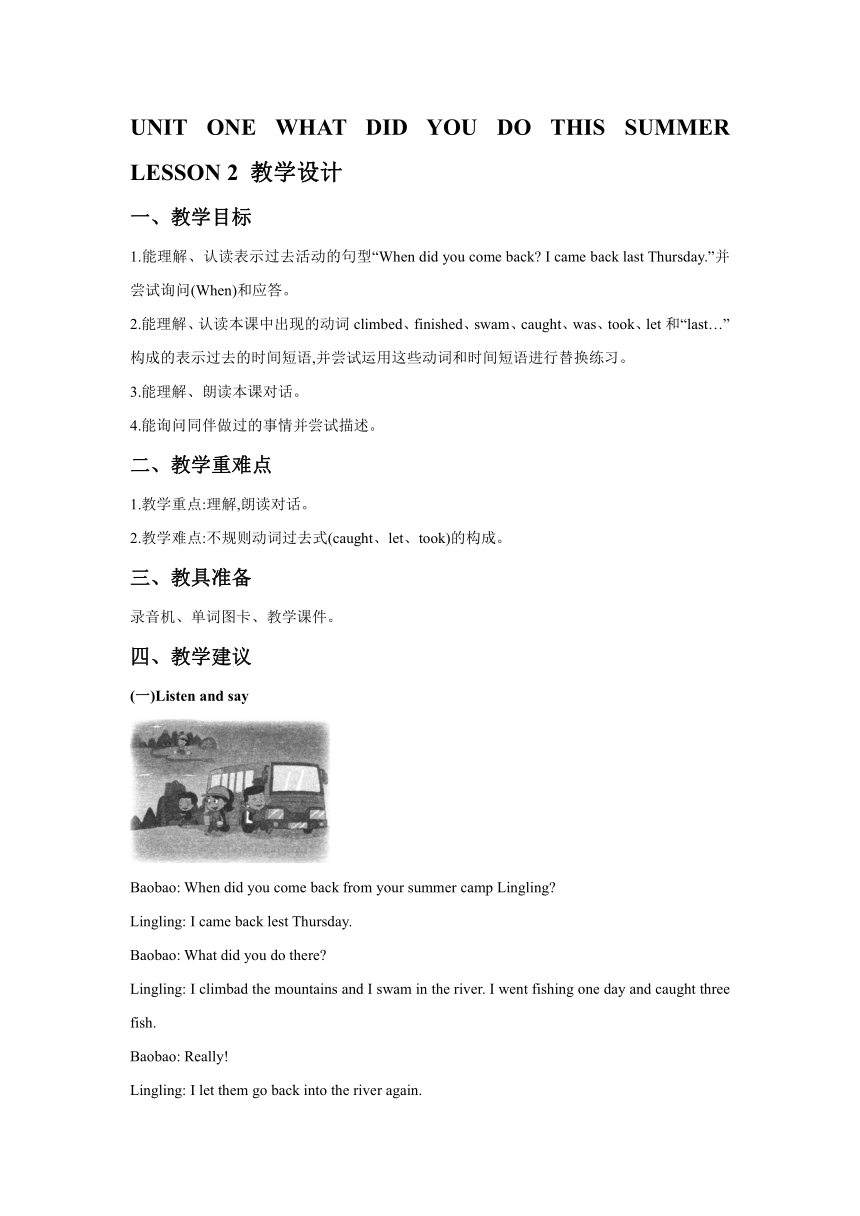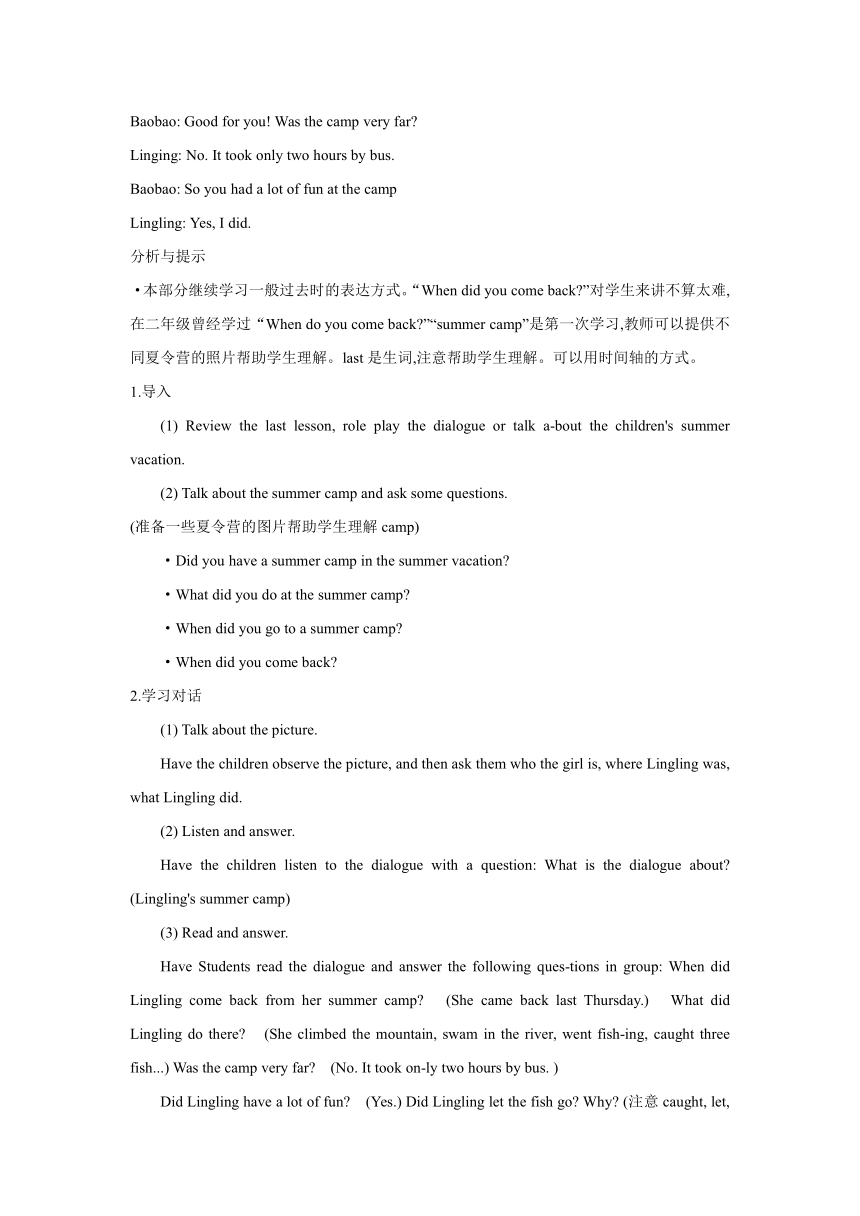Unit 1 What did you do this summer Lesson 2 教学设计
文档属性
| 名称 | Unit 1 What did you do this summer Lesson 2 教学设计 |  | |
| 格式 | zip | ||
| 文件大小 | 132.6KB | ||
| 资源类型 | 教案 | ||
| 版本资源 | 北京版 | ||
| 科目 | 英语 | ||
| 更新时间 | 2018-06-13 15:27:19 | ||
图片预览


文档简介
UNIT ONE WHAT DID YOU DO THIS SUMMER LESSON 2 教学设计
一、教学目标
1.能理解、认读表示过去活动的句型“When did you come back? I came back last Thursday.”并尝试询问(When)和应答。
2.能理解、认读本课中出现的动词climbed、finished、swam、caught、was、took、let和“last…”构成的表示过去的时间短语,并尝试运用这些动词和时间短语进行替换练习。
3.能理解、朗读本课对话。
4.能询问同伴做过的事情并尝试描述。
二、教学重难点
1.教学重点:理解,朗读对话。
2.教学难点:不规则动词过去式(caught、let、took)的构成。
三、教具准备
录音机、单词图卡、教学课件。
四、教学建议
(一)Listen and say
Baobao: When did you come back from your summer camp Lingling?
Lingling: I came back lest Thursday.
Baobao: What did you do there?
Lingling: I climbad the mountains and I swam in the river. I went fishing one day and caught three fish.
Baobao: Really!
Lingling: I let them go back into the river again.
Baobao: Good for you! Was the camp very far?
Linging: No. It took only two hours by bus.
Baobao: So you had a lot of fun at the camp
Lingling: Yes, I did.
分析与提示
·本部分继续学习一般过去时的表达方式。“When did you come back?”对学生来讲不算太难,在二年级曾经学过“When do you come back?”“summer camp”是第一次学习,教师可以提供不同夏令营的照片帮助学生理解。last是生词,注意帮助学生理解。可以用时间轴的方式。
1.导入
(1) Review the last lesson, role play the dialogue or talk a-bout the children's summer vacation.
(2) Talk about the summer camp and ask some questions.
(准备一些夏令营的图片帮助学生理解camp)
·Did you have a summer camp in the summer vacation?
·What did you do at the summer camp?
·When did you go to a summer camp?
·When did you come back?
2.学习对话
(1) Talk about the picture.
Have the children observe the picture, and then ask them who the girl is, where Lingling was, what Lingling did.
(2) Listen and answer.
Have the children listen to the dialogue with a question: What is the dialogue about? (Lingling's summer camp)
(3) Read and answer.
Have Students read the dialogue and answer the following ques-tions in group: When did Lingling come back from her summer camp? (She came back last Thursday.) What did Lingling do there? (She climbed the mountain, swam in the river, went fish-ing, caught three fish...) Was the camp very far? (No. It took on-ly two hours by bus. )
Did Lingling have a lot of fun? (Yes.) Did Lingling let the fish go? Why? (注意caught, let, took的构成)
(4) Group game: Domino card.
(Start)What did Lingling do this summer?
She went to a summer camp. What did she do there?
She climbed mountains. Where did she catch the fish?
She caught fish in the river. How many fish did she catch?
She caught three. Did she let the fish go?
Yes, she did. (Finish)
把上面的表格印到A4纸上,按格横向剪开,放到信封里。学生3~6人一组,小组内做这个活动。每人从信封中抽一个纸条。抽到Start的开始读后面的句子,其他人认真听,看自己的第一个句子是否能回答上一个人的问题,读出答案和自己的问句,直到Finish游戏结束。
(5)Listen and repeat.
Students follow the tape to read the dialogue.
(6)Read in roles.
Have them role play the dialogue.First read with teacher,then read in group,and then group show.
教师要注意引导学生模仿录音中的语音、语调做跟读练习。根据学生的实际情况,部分句子、词语可重复跟读,重点练习,强化记忆。
(二)Listen, look, and learn
分析与提示
·本部分提供了时间短语和动词短语操练所需的主要句型。学生可根据配图替换句中的黑体字部分,达到熟练运用的目的。图中给出的仅仅是示例。教师可以根据情况适当增加一些学生熟悉的词汇。
(1)Show the pictures and listen to the phrases twice(came back/last Thursday, went to the airport/last Monday morning, fin-ished the piano lessons/last week).
(2)Listen and repeat.
(3)Ask and answer in pairs.
Have the children ask and answer in pairs with the above words or they can use other phrases to practice.
(4)Snowball Game.
每组一张A4纸,每张纸最上面写有下面的一个问题:“What did you do there?”“Where did you go this summer?”“When did vou come back?”还可以根据学生情况增加“Who did you go with?”“How did you go there?”“How do you feel?”等问题。让学生回答本组抽到的问题,写出短语或句子,2分钟后和其他组交换,或者到其他组看他们的问题和答案,对有疑问的地方做标记,或者补充答案。教师巡视并帮助各组解决出现的问题。
(三)Listen and number
分析与提示
·本部分是听力训练,要求学生根据所听内容给图片标号。教师要引导学生认真看图,预测听的内容。其中trans-portation是生词,学生可能听不懂,但并不影响答题。
(1) Have the children observe the pictures and talk about each picture with their partner.
(2) Choose a child to describe what they can see in the pic-tures.
(3) Play the tape twice and have them number the pictures.
(4) Have them listen again and check the answer in class.
(四)Let's do
Activitres
Mon
Tue
Wed
Thur
Fri
Sat
Sun
分析与提示
·此部分写动词短语是难点。教师要设计突破难点的活动。给学生提供支持。
(1)Round table game:每组一张纸,中间方框内写“activ-ities last week”,让学生以小组为单位,每人说出或写出一个动词或动词短语的过去形式。
(2)Show the form in Page 5, ask a child, “What did you do last Monday?”The child Call answer, “I went to the park last Monday.”
(3)Teacher writes down the words“went to the park”into the form. Repeat the procedures until teacher finishes the activity.
(4)Have the children do with their partner.
(5)Have the children describe what his/her partner did last week.
(如果没有时间展示学生的成果,教师可以让学生准备好下一节课再展示,充分给每个学生表达的机会,也可以引导学生根据表格写出自己上周的活动。)
五、可供选择的教学活动
1.Card game:Who win first
学生两人一组,每人准备10张写有动词和它们的过去式的卡片,将卡片混合在一起。游戏开始,每个学生抓10张卡片,然后每次从对方手中抽取一张卡片,如果能和手中的动词组成一对,即原型和过去式是一致的,将卡片放在一旁。如果组合不对,该学生失去本次机会。活动进行到所有的卡片都匹配完毕结束,手中最先没有卡片的学生获胜。
2.Fun words
每名学生准备3张纸条,在3张纸条上分别写上自己的名字、过去做的动作和一个时间,如:Bob、read books、last Sunday morning。学生将自己的纸条分别放在3个盒子里,每名学生从3个盒子里任意抽取一张纸条,根据纸条的内容说一句话,如:“Bob read books last Sunday morning.”
一、教学目标
1.能理解、认读表示过去活动的句型“When did you come back? I came back last Thursday.”并尝试询问(When)和应答。
2.能理解、认读本课中出现的动词climbed、finished、swam、caught、was、took、let和“last…”构成的表示过去的时间短语,并尝试运用这些动词和时间短语进行替换练习。
3.能理解、朗读本课对话。
4.能询问同伴做过的事情并尝试描述。
二、教学重难点
1.教学重点:理解,朗读对话。
2.教学难点:不规则动词过去式(caught、let、took)的构成。
三、教具准备
录音机、单词图卡、教学课件。
四、教学建议
(一)Listen and say
Baobao: When did you come back from your summer camp Lingling?
Lingling: I came back lest Thursday.
Baobao: What did you do there?
Lingling: I climbad the mountains and I swam in the river. I went fishing one day and caught three fish.
Baobao: Really!
Lingling: I let them go back into the river again.
Baobao: Good for you! Was the camp very far?
Linging: No. It took only two hours by bus.
Baobao: So you had a lot of fun at the camp
Lingling: Yes, I did.
分析与提示
·本部分继续学习一般过去时的表达方式。“When did you come back?”对学生来讲不算太难,在二年级曾经学过“When do you come back?”“summer camp”是第一次学习,教师可以提供不同夏令营的照片帮助学生理解。last是生词,注意帮助学生理解。可以用时间轴的方式。
1.导入
(1) Review the last lesson, role play the dialogue or talk a-bout the children's summer vacation.
(2) Talk about the summer camp and ask some questions.
(准备一些夏令营的图片帮助学生理解camp)
·Did you have a summer camp in the summer vacation?
·What did you do at the summer camp?
·When did you go to a summer camp?
·When did you come back?
2.学习对话
(1) Talk about the picture.
Have the children observe the picture, and then ask them who the girl is, where Lingling was, what Lingling did.
(2) Listen and answer.
Have the children listen to the dialogue with a question: What is the dialogue about? (Lingling's summer camp)
(3) Read and answer.
Have Students read the dialogue and answer the following ques-tions in group: When did Lingling come back from her summer camp? (She came back last Thursday.) What did Lingling do there? (She climbed the mountain, swam in the river, went fish-ing, caught three fish...) Was the camp very far? (No. It took on-ly two hours by bus. )
Did Lingling have a lot of fun? (Yes.) Did Lingling let the fish go? Why? (注意caught, let, took的构成)
(4) Group game: Domino card.
(Start)What did Lingling do this summer?
She went to a summer camp. What did she do there?
She climbed mountains. Where did she catch the fish?
She caught fish in the river. How many fish did she catch?
She caught three. Did she let the fish go?
Yes, she did. (Finish)
把上面的表格印到A4纸上,按格横向剪开,放到信封里。学生3~6人一组,小组内做这个活动。每人从信封中抽一个纸条。抽到Start的开始读后面的句子,其他人认真听,看自己的第一个句子是否能回答上一个人的问题,读出答案和自己的问句,直到Finish游戏结束。
(5)Listen and repeat.
Students follow the tape to read the dialogue.
(6)Read in roles.
Have them role play the dialogue.First read with teacher,then read in group,and then group show.
教师要注意引导学生模仿录音中的语音、语调做跟读练习。根据学生的实际情况,部分句子、词语可重复跟读,重点练习,强化记忆。
(二)Listen, look, and learn
分析与提示
·本部分提供了时间短语和动词短语操练所需的主要句型。学生可根据配图替换句中的黑体字部分,达到熟练运用的目的。图中给出的仅仅是示例。教师可以根据情况适当增加一些学生熟悉的词汇。
(1)Show the pictures and listen to the phrases twice(came back/last Thursday, went to the airport/last Monday morning, fin-ished the piano lessons/last week).
(2)Listen and repeat.
(3)Ask and answer in pairs.
Have the children ask and answer in pairs with the above words or they can use other phrases to practice.
(4)Snowball Game.
每组一张A4纸,每张纸最上面写有下面的一个问题:“What did you do there?”“Where did you go this summer?”“When did vou come back?”还可以根据学生情况增加“Who did you go with?”“How did you go there?”“How do you feel?”等问题。让学生回答本组抽到的问题,写出短语或句子,2分钟后和其他组交换,或者到其他组看他们的问题和答案,对有疑问的地方做标记,或者补充答案。教师巡视并帮助各组解决出现的问题。
(三)Listen and number
分析与提示
·本部分是听力训练,要求学生根据所听内容给图片标号。教师要引导学生认真看图,预测听的内容。其中trans-portation是生词,学生可能听不懂,但并不影响答题。
(1) Have the children observe the pictures and talk about each picture with their partner.
(2) Choose a child to describe what they can see in the pic-tures.
(3) Play the tape twice and have them number the pictures.
(4) Have them listen again and check the answer in class.
(四)Let's do
Activitres
Mon
Tue
Wed
Thur
Fri
Sat
Sun
分析与提示
·此部分写动词短语是难点。教师要设计突破难点的活动。给学生提供支持。
(1)Round table game:每组一张纸,中间方框内写“activ-ities last week”,让学生以小组为单位,每人说出或写出一个动词或动词短语的过去形式。
(2)Show the form in Page 5, ask a child, “What did you do last Monday?”The child Call answer, “I went to the park last Monday.”
(3)Teacher writes down the words“went to the park”into the form. Repeat the procedures until teacher finishes the activity.
(4)Have the children do with their partner.
(5)Have the children describe what his/her partner did last week.
(如果没有时间展示学生的成果,教师可以让学生准备好下一节课再展示,充分给每个学生表达的机会,也可以引导学生根据表格写出自己上周的活动。)
五、可供选择的教学活动
1.Card game:Who win first
学生两人一组,每人准备10张写有动词和它们的过去式的卡片,将卡片混合在一起。游戏开始,每个学生抓10张卡片,然后每次从对方手中抽取一张卡片,如果能和手中的动词组成一对,即原型和过去式是一致的,将卡片放在一旁。如果组合不对,该学生失去本次机会。活动进行到所有的卡片都匹配完毕结束,手中最先没有卡片的学生获胜。
2.Fun words
每名学生准备3张纸条,在3张纸条上分别写上自己的名字、过去做的动作和一个时间,如:Bob、read books、last Sunday morning。学生将自己的纸条分别放在3个盒子里,每名学生从3个盒子里任意抽取一张纸条,根据纸条的内容说一句话,如:“Bob read books last Sunday morning.”
同课章节目录
- Unit 1 What did you do this summer?
- Lesson 1
- Lesson 2
- Lesson 3
- Lesson 4
- Unit 2 What happened to your neck?
- Lesson 5
- Lesson 6
- Lesson 7
- Lesson 8
- Unit 3 How did you go to Hangzhou?
- Lesson 9
- Lesson 10
- Lesson 11
- Lesson 12
- Unit 4 Revision
- Lesson 13
- Lesson 14
- Unit 5 When did the ancient Olympic Games begin?
- Lesson 15
- Lesson 16
- Lesson 17
- Lesson 18
- Unit 6 What is he wearing?
- Lesson 19
- Lesson 20
- Lesson 21
- Lesson 22
- Unit 7 What are the twelve animals?
- Lesson 23
- Lesson 24
- Lesson 25
- Lesson 26
- Unit 8 Revision
- Lesson 27
- Lesson 28
